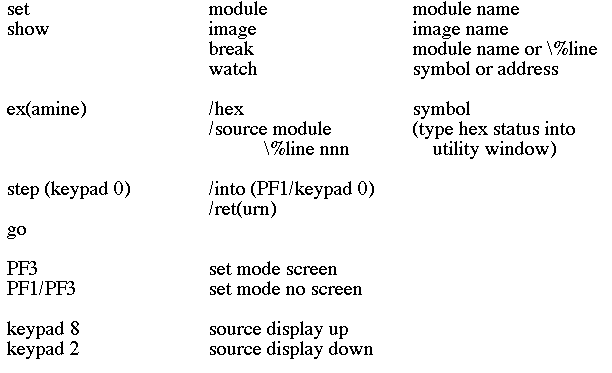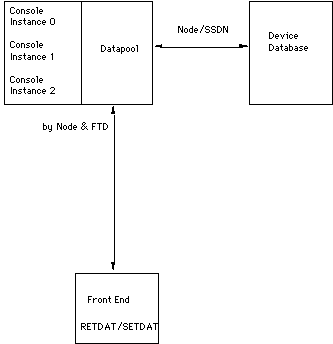while (TRUE)
{/* get next interrupt */
window_intype(&window_id,&int_type,&row,&column,&info);
switch (int_type)
{
case INTINI: /* initialization interrupt (event) */
pgm_ini();
break;
case INTTRM: /* termination interrupt (event) */
pgm_trm();
break;
case INTKBD: /* keyboard/user interrupt (event) */
pgm_kbd();
break;
case INTPER: /* periodic interrupt (event) (~15Hz) */
pgm_per();
break;
}
}
Where should it run?
* window vs. screen
`screen' is an X window
`window' can mean an X window or a portion of one
* Primary Application
best user interaction support
owns one alphanumeric and two graphic windows/screens
do NOT use touch panel window!
* Secondary Application
usually display/monitor only
owns one graphic window/screen
* Nonuser Application
no visible display
started up with console
Libraries
*
Do NOT use old/archaic CLIB routines! (TVM,LX,DPM,DBM,etc.)
*
routines can be called from either C++ or FORTRAN
*
routines with `_c' suffix are `C++ friendly' versions
*
top level topics
CLIB_INFO CONSOLE_INFO C_MACROS DATALOGGER DATA_MANIPULATION DIO_ALARMS DIO_DATABASE DIO_DIGITAL DIO_MODEL DIO_RAW DIO_SCALED DIO_TABLE ERROR_LOGGING EVENTS_AND_CLOCKS FILE_IO GRAPHICS_SCREENS GRAPHICS_WINDOWS INTER_NODE_IO INTRA_NODE_IO KNOB_DATA NETWORK_NAMES NEWS OLD_CLIB PRINT NEW_USER OTHER_DATA_IO ARGUMENT_HANDLING PROGRAM_CONTROL PROGRAM_UTILITIES SAVE_RESTORE SCRIPT TIME TOUCH_PANEL TV_WINDOWS USER_LIBRARIES
Anatomy of a Library Routine Help Entry
* components of a help entry
calling description with argument data types
routine functional description
verbose description of arguments
description of returned status (if applicable)
required header/include files
related functions (hot links in WWW version)
Anatomy
of a Library Routine Help Entry
(continued)
* each argument is listed as - name.data_type.passing_mechanism
status.i4.v = str_is_blank_c(string.i1a.r [,length.i4.v])
(The complete description of possible values is in the `intro_help' help topic.)
*
arguments enclosed by square brackets are optional
*
The default values of optional arguments should be listed in the help. Zero is
NOT the universal default value.
Error Handling/Logging
* ACNET errors are composed of two parts:
facility: integer code that identifies the subsystem that emitted the error
error: integer code that defines the specific error within the facility
for example: 17 -10 indicates a timeout reported by DPM on setting a device
(DPM_TMOSET is the ASCII version of this error code)
* Primary Applications should include an error display window
error_init(_c) - define error display format
can map error messages to console and/or shared log files which can be viewed
using `Pgm_Tools'
*
display errors with `error_display(_c)'
*
display user messages with `error_message(_c)'
Window Manager
*
manages usage of alphanumeric (TV) windows
*
background window always exists (WMNGR_BACKGROUND)
should always set the background window size during initialization
*
coordinates are row and column (usually in that order)
*
origin for coordinates in a window is in the upper left hand corner
origin coordinates for the background window are (1,1)
origin coordinates for all other windows are (0,0)
*
physical vs. logical coordinates
*
windows are referred to by a two byte integer ID or handle
*
window text files can be edited on D10
Window Manager (continued)
* basic routines
window_intype - returns program interrupts/events and manages restacking, moving, and resizing windows
window_enable_interrupts - enables automatic window management
window_set_background_size(_c) - sets background window size
window_construct(_c) - creates a new window (returns ID)
window_tvm(_c) - reads or writes a text string (physical coordinates)
window_delete(_c) - deletes a window
window_display_value(_c) - displays a value (many data types) in a window
window_input_value(_c) - inputs a value (many data types from a window)
in_window_field(_c) - tests for an interrupt in a window field
in_window_box(_c) - tests for an interrupt in a window region
window_printf_at_c - printf-like output at a specific location with support for
embedded color codes and site specific conversions
Window Manager (continued)
* scrolling routines
window_enable_scroll_io(_c) - enable I/O to the window's scroll buffer
window_entry_to_row_c - converts logical to physical row coordinates
window_row_to_entry_c - converts physical to logical row coordinates
window_write_line_c - writes text strings to sequential rows
window_sequential_write_c - writes text strings either to the last accessed
row or the next sequential one
window_write_scroll_c - writes text strings in a scrolling terminal format
window_printf_c - works like printf except that it supports embedded color
codes as well as site specific conversions
Window Manager (continued)
*
highlighting routines
*
switch routines
*
menu bar routines
use two back slashes (\\) to separate menu bar items
*
slider routines
*
select field routines
*
high level dialogs
scroll_menu(_c) - popup menu
decide(_c) - logical decision dialog (`caution user')
winput(_c) - inputs multiple data types
input_array_values_c - input arrays of different types
acknowledge(_c) - simple acknowledge message dialog
many more...
can try out dialog routines using Example Program #5 on W5
WNLIB
*
manages usage of graphic (LX) windows
*
background window always exists (WN_BACKGROUND)
*
coordinates are X and Y
*
virtual coordinates
define size and location of windows/view ports
origin is in the lower left hand corner
coordinate values range from 0.0 to 1.0
* world coordinates
real world/engineering coordinates within a window
origin is in the lower left hand corner
coordinate values are set by a call to `wn_world(_c)'
* windows are referred to by a four byte integer ID or handle
WNLIB (continued)
* normal function sequence
wn_view(_c) - create window using virtual coordinates
wn_world(_c) - establish real world/engineering units scaling
wn_active(_c) - make this window the active drawing window
execute drawing or other setup commands
* only the active window can be drawn to
even the background window must be activated before drawing on it
* text coordinates can be either normal world coordinates or row and column coordinates
set by calling `window_text_scaling_c'
* simple plot support
create window and labeled grid in one call using either `wn_grid(_c)' or
`wn_quick_grid'
plot a buffer of points by calling `wn_point_set'
WNLIB (continued)
* data manipulation routines
save/recall plotted data
perform simple statistics on saved data
fit saved data
*
cursor manipulation routines
*
switch routines
*
most features can be demonstrated by using the WNTEST program (D110)
DIO
* accesses both `live' and database data
data is addressed by a unique four byte key called a Device Index and by a Property Index (Property Indices are listed in the dbprops header)* `live' data also requires the specification of a Frequency Time Descriptor (FTD)
FTD_ONESHOT - retrieve the data once and if successful cancel the request
FTD_1HZ * constant - retrieve the data at a periodic rate
(Note: Periodic FTDs are expressed in terms of 60 Hz ticks between data
retrievals. Therefore, a larger FTD value indicates slower data retrieval.)
FTD_EVENT_MASK | clock_event - retrieve the data on the occurrence of the specified Tevatron CLocK (TCLK) event
* caches static database information to improve program performance
DIO (continued)
* simplest case - reading a single scaled value
status = dio_get_dev_c(device_index,property,&value,FTD_ONESHOT);
`device_index' can be obtained from the device name by calling the routine
`dio_device_index(_c)'.
`property' can be either reading (PRREAD) or setting (PRSET).
`value' is the returned device value.
Since this is a one shot read, the request does not have to be canceled.
Otherwise, `dio_can_get_c' would be called to cancel the request.
The returned status is a standard ACNET status value. (OK -> success)
DIO (continued)
* reading an array of scaled values - 3 steps
build the list of requests and return the list ID
status = dio_bld_get_c(&list_id,num_devices,device_indices,
properties,errors,FTD_1HZ);
read the list of values
status = dio_get_lst(&list_id,values,errors);
cancel the list of requests (not a one shot)
dio_can_get_lst(&list_id);
* DIO array status handling
If status is OK, the operation was successful.
If status is less than OK, there was an overall failure and the status
value is a standard ACNET status value.
If status is greater than OK, some requests have succeeded and some have
failed. The status value is the number of requests which failed. Use the
routine `error_in_list(_c)' to find the actual ACNET error.
DIO (continued)
* important routines
dio_get_dev(_c) - retrieve a single scaled device
dio_get_raw(_c) - retrieve a single raw device
dio_get_array_device_c - retrieve a single array device
dio_can_get(_c) - cancel a single device request
dio_set_dev(_c) - set a single scaled device
dio_set_raw(_c) - set a single raw device
dio_set_array_device_c - set a single array device
dio_can_set(_c) - cancel a single device setting request
dio_bld_get - build a scaled device retrieval list
dio_get_lst - retrieve a list of scaled devices
dio_can_get_lst - cancel a retrieval list
dio_bld_set - build a scaled device retrieval list
dio_set_lst - retrieve a list of scaled devices
dio_can_set_lst - cancel a setting list
Data Storage
*
relational database tables
*
accessed via calls to `db_open, db_select, db_modify, and db_close'
*
accessed using SQL
`Visual Guide to SQL' by Trimble and Chappell, John Wiley and Sons
*
most appropriate if rows have limited number of fields
*
tables are created using interactive SQL (sqsh)
need account from Database Administrators
Simple Data Storage
*
for saved data totaling less than 256 bytes
*
primarily for saving simple user configuration data
*
`pgm_data_storage' - provides unique data for each console
*
`pgm_data_storage_shared' - provides the same data for every console
Data Conversions
*
numeric_to_ascii(_c) - convert values to ASCII
*
ascii_to_numeric(_c) - convert ASCII to numeric values
*
clib_sprintf - normal sprintf functionality plus many site specific
conversions
User Libraries
*
stored in MECCA like applications
*
run time linked to applications
*
examples
ul_cbsaux - generally useful routines, similar to CLIB
ul_physlib - physics calculation routines which are independent of user interface (includes routines from Numerical Recipes in C)
ul_windowlib - extensions to window_manager routines
ul_dialoglib - more high level dialog routines
ul_friglib - access routines for the refrigerator systems
Development Aids
* cc/standard=portable
use this from the beginning of development
checks for portability problems
eliminate all problems generating portability problems
* lint - `lcl_lint output_file source_file'
finds logic and portability problems that the compiler misses
may save lots of time in the long run
use this from the beginning of development
* useful applications
D10 - supports interactive layout of text windows
WNTEST (D110) - allows interactive use of WNLIB routines
Window Manager TST (D133) - allows interactive use of window_manager
routines
Example Program #5 (W5) - allows interactive use of dialog routines
Testing and Debugging
*
Z index
*
debug_slot
*
settings lock
*
redirection
*
peeker programs
Z index, D7
*
testing and debugging
*
mecca/development to Z index or D7
*
Z index
cleared each morning at 3 a.m.
listed by author and PA number
use normal PA number; Z index version is distinct
* D7 Quick-SA-Test
next launch debug version
cleared on next index load
* select a debugger display method
debug_terminal
debug_window
debug_slot
* debug_terminal vs debug_window
CNS40> debug_slot
Select a slot to debug as follows:
1 = PA A
2 = GRAPHICS 1 SA
3 = GRAPHICS 2 SA
4 = ALARMS slot
5 = PA B
Slot number: 1
Start up the application to be debugged.
Use CONTROL/C to break into executing program.
OpenVMS VAX DEBUG Version V6.2-000
%DEBUG-I-INITIAL, language is C, module set to PA0758
DBG>
debug_slot (cont'd)
SRC: module PA0758 -scroll-source
11454: while (TRUE) {
11455: window_intype(&mwid, &type, &row, &col,
&info);
11456: switch (type) {
11457: case 1:
11458: intype_initialize(FALSE,FALSE);
->1459: break;
11460: case 2:
11461: intype_terminate(row,col);
11462: break;
11463: case 3:
11464: intype_interrupt(row,col);
OUT -output
DBG> Step
debug_slot (cont'd)

